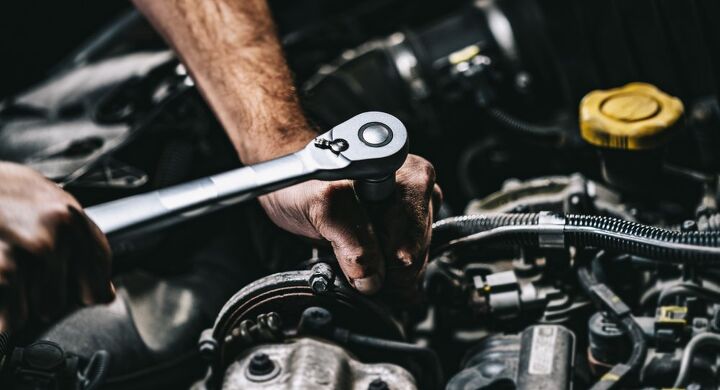#AutomotiveRepair
Study Suggests Time Plays Important Factor in Repair Costs for EVs Vs ICEs
Since the hottest news surrounding the automotive industry today happens to be rolling updates about supply shortages, factory downtime, and how it’s not impacting manufacturing profits as much as anticipated, I’ve been diving back into studies and research pertaining to the future of the automotive industry. It’s a little more enjoyable for my own gray matter to process and might provide readers with a touch more to ponder than another story about how automakers are stalling production because an insufficient number of doodads were placed on a boat that’s waiting off the California coastline.
Earlier this week, we examined research exploring how much electric vehicles actually cost to run and that theme will persist. There’s a new study suggesting EVs boast lower repair bills than gasoline-driven alternatives. But there’s an interesting tipping point that occurs early in a vehicle’s lifespan that makes it happen. Before that, it’s cheaper on average to maintain something equipped with an internal combustion engine.
Right-to-Repair Movement Gets Federal Attention
While the right-to-repair movement is fighting a national battle, the brunt of the action has been taking place on America’s coasts. Consumer activists are taking on multinational corporations that don’t want you to modify your mobile devices, affix aftermarket components to your vehicle, or have complete access to the data that’s amassed by the staggering number of products that are needlessly networked to the internet. After years of petitioning the government, often while arguing with high-paid lobbyists, the group achieved a major victory in Massachusetts in 2020. Voters decided that automakers should not be allowed to withhold information from the vehicle’s owner or use it as a way to prohibit them from taking their car into independent repair shops (rather than manufacturer-certified service centers) or tinkering with it themselves.
Now the federal government is getting involved. Joe Biden has signed an executive order that effectively forces the Federal Trade Commission (FTC) to take regulatory action that would settle the matter. But we don’t really know if that’s going to lead to a market where customers are free to treat their property (and private data) as they wish, one where the manufacturer holds all the cards, or simply result in a regulatory minefield displeasing all parties.
Automotive Alliance Manages to Delay Revised Massachusetts Right to Repair Law
The Alliance for Automotive Innovation (AAI) has managed to stall enforcement of a ballot measure recently passed in Massachusetts that expands access to data related to vehicle maintenance and repair. Last week, the relatively new lobbying/trade group asked a U.S. district court for a temporary order that would bar implementation of the state’s new right-to-repair rules aimed at giving vehicle owners more direct control of their private data and independent repair shops a fighting chance of staying in business. But the state’s attorney general has already decided that the rules are invalid until after federal cases have been decided.
The decision represents another victory for giant, multinational corporations at the expense of disgusting citizens interested in controlling their personal information and small business owners who have had it easy for far too long.
Massachusetts Passes Right-To-Repair Protections
Independent repair shops and aftermarket parts retailers have been pitted against major automakers and their dealer networks in Massachusetts for years. The state has served as the primary battleground for right-to-repair legislation that would permit/prohibit customers and independent entities from working on or modifying vehicles. However, a major victory came on Tuesday after voters overwhelmingly approved a ballot measure updating existing right-to-repair laws to give vehicle owners and small shops better access to vehicle data typically reserved for industry giants.
The resulting decision gives consumers substantially more control over what’s done with the data being harvested by the industry (often without their knowledge) and frees up their options on who to go to when their vehicle needs fixing.
Hope You're Handy: Chicago Mechanics Are Still on Strike
Mechanics at roughly 130 new car dealerships in Chicago went on strike Tuesday morning. According to the Automobile Mechanics’ Union Local 701, nearly 2,000 grease monkeys threw in the towel before also tossing a wrench into dealer maintenance schedules — leaving customers to fend for themselves.
On the first day of the strike, Mark Bilek, senior director of communications for the Chicago Automobile Trade Association, issued a statement that most affected dealerships would remain open with partially functional service centers. “They may not be performing complex repairs, but oil changes, stuff like that, it’s business as usual,” said Bilek in a statement.
However, the union stated that wouldn’t last for long if demands were not met. It has been bargaining with the New Car Dealer Committee since June, citing uncompensated time, unacceptable schedules, unsatisfactory pay, and no opportunities for career progression as its chief complaints. Deadlocked since negotiations began, the union decided to halt all work at the beginning of August — despite Bilek’s assurance that customers could still get their oil changed or tires rotated.
Advancements in Tech Makes More Wrecked Vehicles Too Expensive to Repair
Safety enhancements are, undoubtedly, a good thing. People are walking away from wrecks that would have been fatal a few decades earlier and crash avoidance systems can keep inattentive drivers out of trouble altogether. The downside is that these features have made vehicles more expensive to purchase and repair.
Bob Tschippert, the senior vice president of underwriter Risk Theory, says that advancements in technologies have made vehicle repairs so costly that insurance companies have begun declaring substantially more injured cars a total loss. “In the past, if you had a front-end collision, you had damage to the engine or the front end,” Tschippert explained. “But now, with the number of airbags that can run from $1,000 up to $4,000 and all the sensors up front, you’re seeing more totals.”
Tornado Vs. Fiat Chrysler Dealership Is Not a Fair Fight
A Fiat Chrysler-affiliated dealership in Texas was hit by a tornado Saturday night, suffering catastrophic damage to its showroom, service center, and inventory. If you’ve ever wondered how your oversized truck would stack up against the awesome power of Mother Nature, look no further than the scattered and overturned vehicles that once occupied Interstate 20 Chrysler Dodge Jeep Ram of Canton’s parking lot.
Possibly the Best Reason to Have Your Vehicle Serviced by an Accredited Dealer
A Houston man says his Lexus went missing after the local auto repair shop, which he entrusted to fix his car, closed without notice. Returning to the mechanic to make a prearranged twice-monthly payment, he noticed an eviction notice and a completely empty parking lot.
“I’m thinking this guy has stolen my car,” said Randy Exom of the mechanic after being unable to find his automobile.





















Recent Comments